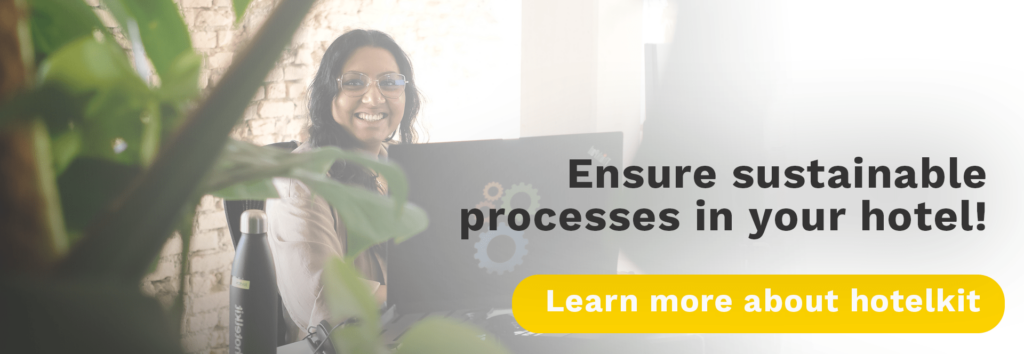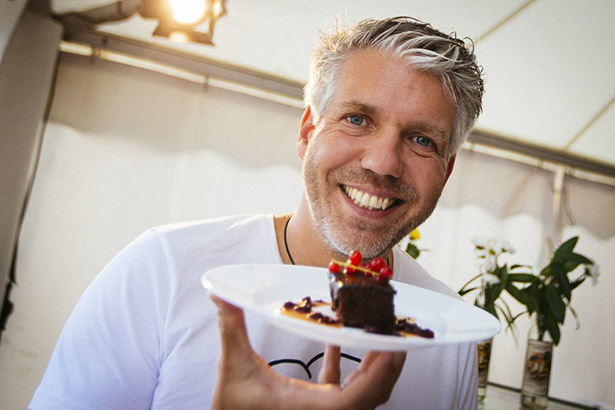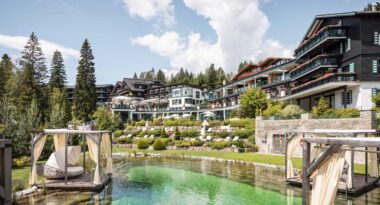Sustainability is currently on everyone’s lips. All too often, however, sustainability is still associated with high additional costs. But even small businesses can continuously strive to become sustainable. The consultant and hotelier Björn Grimm takes a look at the implementation of sustainability in the hospitality industry and encourages particularly medium-sized hotels to dare to strive for change.
Why is sustainability a desirable goal to work towards in the hospitality industry?
The meaning of the word sustainability is rather broad; the concept in its entirety constitutes a valuable guideline for businesses. Just like in forestry where the focus needs to be on sustainable forestry, it is equally important for the tourism industry to act on a long-term basis in order to still generate considerable revenue in years to come and also remain interesting to guests. From an economic perspective, it is therefore important to realize investments that are profitable for the business in the long run.
As a hotelier I continuously need to ask myself what I can do to make sure that my employees are doing well in the long run. Sustainability, for example, also implies to deem a contribution to the pension scheme of the employees necessary and providing them with an ergonomic and meaningful place to work. This certainly pays off: This year, at a time when the tourism industry is desperately looking for qualified personnel, we were able to recruit 10 new trainees to our company.
It is also close to my heart to convey to our employees how hotels are intrinsically linked to the region they are located in. After all, the guests do not only come to stay at the hotel, but they come to see and experience the surroundings, nature and local produce. This is also the reason why our chef visits the surrounding businesses, such as cheese dairies, fishing cutters and farmers with the team. This way our employees notice the link between the hotel and the region and become aware of the bigger picture. So now whenever they are cleaning Brussel sprouts in the kitchen, they will no longer consider it a dull task, but a contribution to regionality that secures the livelihoods of the farmers. Moreover, due to shorter transport routes, the product is still fresh when it arrives in our kitchen. It is part of a framework that all of us depend on and to whose conservation we all want to contribute to.

You wrote the multiple award-winning guidebook “Der Küchencoach” – What is it about?
Der Küchencoach offers numerous tips for chefs and entrepreneurs on how to deal with the challenges that they are facing in their daily work routines. This guidebook mainly focuses on the questions that we get asked frequently, for example, how to sustainably achieve good prices and results in the kitchen, how to successfully renovate the kitchen or what is needed to keep the work motivation in the top gastronomy at a high level. I am always glad when I see the book on my customers’ shelves.
If management decides to implement a digital tool to promote sustainability within the business, what needs to be considered beforehand?
Prior to the implementation of digital tools, I need to ask myself what I want to achieve with this tool. The goal should be to lighten the employees’ workload and subsequently create more time for important processes such as attracting guests. To do so, I must first reflect on whether the work process that I want to digitalize will in fact become more efficient through the implementation of a digital tool. If I decide to digitalize a bad work process, the process does not become more efficient, it simply becomes a bad digitalized work process. Apart from that, I also need to convince my team of this novelty. If the digital tool is not being used by my team, the investment was pointless. Furthermore, I also need to be aware that some team members might have to be persuaded to work with the tool which is why facts on its usage can be helpful.
For example, an acquaintance of mine implemented a robot in his restaurant which assists the service team on busy days. At the start, some team members did not like this. But after they saw the records of the robot and realized how many kilometers were now covered by the robot each month, they were very enthusiastic about the new technological assistance.
How do businesses succeed in transitioning to sustainability?
During consultations I often notice that a bad mindset can hinder the implementation of sustainable measures within a business. The principle that sustainability is too expensive for medium-sized businesses is still omnipresent. This is also why I consider redirecting my customers away from this point of view and towards a new and clear perspective an important first step. It is also important to note that sustainability does not necessarily start off with big changes, it starts with small changes. We should all ask ourselves: Based on my financial capacities, what can I do day by day, quarter by quarter, and year by year to be more ecological? For example, when it comes to the delivery of food orders for the kitchen, I can already achieve a considerable sustainable impact by bundling orders, so the supplier only needs to come once a week instead of 3 times per week. Furthermore, I can take a look at the produce that is being used in the dishes. Is the produce that I use grown regionally? If not, what produce can I use instead that is grown in this region? Apart from that, the energy crisis that we are currently facing forces us to be more economical with our resources and thus be more sustainable. Putting a lid on a pot whilst cooking can already make a big difference. If I continuously strive to become more sustainable and act each day a bit more sustainable than the day before, a lot can be achieved.
To get there, I believe that an agile and inclusive process is the best way to go. Not only management but the entire team should be involved in working out a plan for sustainable measures. In working groups about topics such as waste prevention, kitchen and energy, everyone, be it a trainee or a head of department, can contribute towards the ecological optimization of the business. This way, it can also made sure that the value of sustainability is backed by everyone in the company.
How does Grimm Consulting assist restaurants and hotel businesses in moving towards sustainability?
As a consulting agency that particularly focuses on independent hotels, our main goal is of course economic improvement as well as the optimization of processes and figures. Sustainability is no longer a choice; over the last years it has become a must. Apart from that, profitability and green thinking are not incompatible and go hand in hand. In workshops and working groups, for example, we work together with our clients on developing measures that are economically feasible and at the same time viable.
As a result of the many years of experience in the management of hotel businesses as well as the expertise we acquired from advising and supporting 2,800 businesses to date, we bring a lot of ideas to the table that can be put into practice. We can thus be considered a catalyst and encourage all parties involved to be courageous – it is definitely worth it! Moreover, it is also important not to think in absolute terms: It is not possible and unrealistic to think that everything can be changed overnight. We should all understand that it is important to work towards this goal on a long-term basis and we should not hinder ourselves on the way there. This process should and can be fun!
About Grimm Consulting
The company Grimm Consulting specializes in business consultancy for hotel businesses and restaurants, is located in Lüneburg and has an additional office in Hamburg. Grimm Consulting was founded in 2003 and has meanwhile advised over 2,800 businesses and received several awards. The Grimm Consulting customer base includes numerous award winners and flamboyant personalities from the hospitality industry as well as traditional restaurateurs. Björn Grimm is a member of the Foodservice Consultants Service International (FCSI), the leading association for consultants in the hospitality and food service industry. Furthermore, he volunteers at various hotel management schools. He is also known as a speaker to numerous people from different professions. During the Internorga, Grimm also offers exciting gastronomic tours through Hamburg. Grimm is currently actively involved in the management of a 4* Superior hotel and is therefore well acquainted with the current challenges!
Special offer by Grimm Consulting: You can now order the book Der Küchencoach for only 25 EUR by writing a message to grimm@gastronomieberatung.de and stating “hotelkit”: You will save 15% on the original sales price!

About the author
Michael Santner
Narratives about impoverished poets during his studies encouraged him to follow his passion in a secure job. In hotelkits marketing he takes care of packing the numerous ideas of his colleagues into exciting stories.





